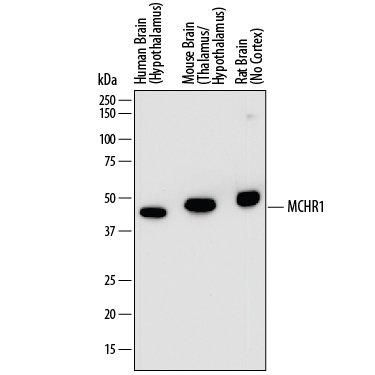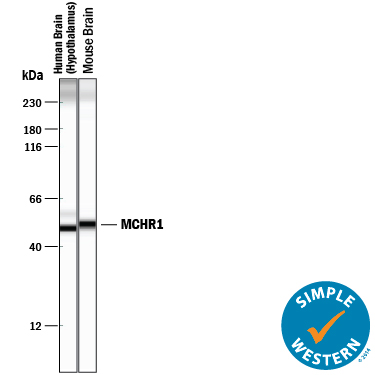Human/Mouse/Rat MCHR1 Antibody Summary
Ser2-Pro113
Accession # Q99705
Applications
Please Note: Optimal dilutions should be determined by each laboratory for each application. General Protocols are available in the Technical Information section on our website.
Scientific Data
 View Larger
View Larger
Detection of Human, Mouse, and Rat MCHR1 by Western Blot. Western blot shows lysates of human brain (hypothalamus) tissue, mouse brain (thalamus/hypothalamus) tissue, and rat brain (no cortex) tissue. PVDF membrane was probed with 1 µg/mL of Mouse Anti-Human/Mouse/Rat MCHR1 Monoclonal Antibody (Catalog # MAB7938) followed by HRP-conjugated Anti-Mouse IgG Secondary Antibody (Catalog # HAF007). A specific band was detected for MCHR1 at approximately 45-50 kDa (as indicated). This experiment was conducted under reducing conditions and using Immunoblot Buffer Group 1.
 View Larger
View Larger
Detection of Human and Mouse MCHR1 by Simple WesternTM. Simple Western lane view shows lysates of human brain (hypothalamus) tissue and mouse brain tissue, loaded at 0.5 mg/mL. A specific band was detected for MCHR1 at approximately 50-52 kDa (as indicated) using 50 µg/mL of Mouse Anti-Human/Mouse/Rat MCHR1 Monoclonal Antibody (Catalog # MAB7938). This experiment was conducted under reducing conditions and using the 12-230 kDa separation system. Non-specific interaction with the 230 kDa Simple Western standard may be seen with this antibody.
Reconstitution Calculator
Preparation and Storage
- 12 months from date of receipt, -20 to -70 °C as supplied.
- 1 month, 2 to 8 °C under sterile conditions after reconstitution.
- 6 months, -20 to -70 °C under sterile conditions after reconstitution.
Background: MCHR1
MCHR1 (melanin-concentrating hormone receptor-1), also called GPR24 (G-protein coupled receptor 24) or SLC1 (somatostatin receptor-like 1), is an approximately 44 kDa, seven-transmembrane receptor for MHC. It is most highly expressed in the brain but is also present in peripheral tissues. Engagement of MHCR1 has effects on food intake, energy homeostasis, anxiety and depression, such that rodents treated with small molecule antagonists weigh less and show reduced anxiety and depression in model systems than untreated rodents. Human MCHR1 shares 74% amino acid (aa) sequence identity with mouse MCHR1 between aa 1-113, and 82% with rat MCHR1 between aa 71-113.
Product Datasheets
FAQs
No product specific FAQs exist for this product, however you may
View all Antibody FAQsReviews for Human/Mouse/Rat MCHR1 Antibody
There are currently no reviews for this product. Be the first to review Human/Mouse/Rat MCHR1 Antibody and earn rewards!
Have you used Human/Mouse/Rat MCHR1 Antibody?
Submit a review and receive an Amazon gift card.
$25/€18/£15/$25CAN/¥75 Yuan/¥1250 Yen for a review with an image
$10/€7/£6/$10 CAD/¥70 Yuan/¥1110 Yen for a review without an image

